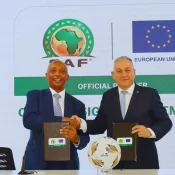
The US may oppose the G7 finance leaders’ attempt to reach a non-tariff agreement in Canada
The Group of Seven industrialized countries’ finance leaders will gather in Canada this week and aim to establish a compromise on non-tariff concerns, but they might find it difficult to work with a Trump administration that is determined to pressure friends to support American interests.
According to G7 officials and economic diplomacy experts, the other six G7 members—Japan, Britain, Germany, France, Italy, and host Canada—want to prevent the strong Western policy alliance from breaking up over U.S. President Donald Trump’s threats and reversals on climate change, international tax cooperation, and Ukraine.
Less precise communication language and avoiding some subjects might be necessary for it. According to a source briefed on U.S. stances in the negotiations, any agreement must be in line with the aims of the Trump administration.
“We’re not inclined to do a communique just for the sake of doing a communique,” the source, who spoke to media confidentially, stated.
The meeting, which will take place in the Canadian Rocky Mountain resort town of Banff, Alberta, from Tuesday to Thursday, will bring together U.S. Treasury Secretary Scott Bessent, other G7 finance ministers, and central bank governors. According to the U.S. source, no bilateral trade agreements will be announced at the G7 conference, but that puts disagreements about Trump’s hefty new tariffs at the forefront of the talks.
Beginning in early July, reciprocal U.S. levies on Japan, Germany, France, and Italy could double to 20% or higher. Canada, the host country, is still dealing with Trump’s separate 25% levy on many exports, while Britain secured a restricted trade agreement that leaves it subject to 10% U.S. tariffs on the majority of goods.
“No one expects this to be a big moment where the U.S. declares that there will be a special regime that’s more favorable for G7 and other partners,” wrote Charles Lichfield, deputy director of the Atlantic Council’s GeoEconomics Center in Washington.
“Ministers from the other six nations will probably attempt to gently remind Bessent that they are the closest allies of the United States and that it is hard for them to comply with Washington’s demands that they put economic pressure on China while being under pressure from the United States themselves,” Lichfield added.
FORUM ON CHINA PUSHBACK
Bessent will force the nations to overcome China’s state-driven economic model and correct imbalances and non-market practices, especially in their own economies, according to a Treasury spokesperson.
“The G7 must cooperate to safeguard our employees and businesses against China’s unfair practices,” the statement continued.
As a former manager of a hedge fund, Bessent has long criticized China’s policies that have generated surplus production capacity and allowed subsidized goods to flood market economies.
G7 leaders will “encourage him to push for more moderate administration policies on trade,” according to Mark Sobel, a former U.S. Treasury and International Monetary Fund official who currently serves as the U.S. chairman of OMFIF, an independent financial policy think tank. Bessent is generally viewed as having a moderating influence on Trump’s trade agenda.
LANGUING TRICKY THE AGE
G7 officials, particularly host Canada, seem intent on reaching a consensus on a joint statement from the finance meeting, despite differences over tariffs. This will pave the way for a summit of G7 leaders in June in the neighboring mountain resort region of Kananaskis.
According to G7 government sources involved with the finance negotiations, a draft communiqué has already been created, and Canada is working to reach an agreement to demonstrate that the G7 nations are united on a number of topics.
Along with Ukrainian Finance Minister Serhii Marchenko attending, these are anticipated to include a wide declaration of support for Ukraine in its fight against Russia’s full-scale invasion, as well as the EU preparing a fresh round of sanctions to put more pressure on Moscow.
The G7’s most recent joint finance declaration, which opened in October 2024, described terms for $50 billion in loans to Ukraine backed by profits from Russia’s frozen sovereign assets. Any statement on Ukraine will be significantly less explicit than that.
A call between Trump and Russian President Vladimir Putin on Monday resulted in Trump declaring that ceasefire negotiations between Russia and Ukraine would start right now, which may postpone further penalties.
According to the U.S. source on the G7 summit, Bessent was opening the door to all possible penalties to put further pressure on Russia to end the war, but any action would be contingent on “the broader peace process.”
Bessent’s reaffirmation of U.S. support for the World Bank and International Monetary Fund in April is likely to be another area of agreement.
Other topics on which agreements can be achieved include Bessent’s demand for a greater reliance on the private sector to spur growth and collaboration in the fight against financial crimes such as money laundering, according to G7 sources.
But Trump’s criticism of the previous U.S. green energy strategy means that climate change rhetoric is likely to cause friction.
Another challenging topic in the meetings is how the G7 would characterize the economic uncertainty and halted business investment unleashed by Trump’s tariffs without directly pointing the finger at his actions.
“My crystal ball is so murky now, I can’t really see the future very well,” stated Suzanne Clark, CEO of the U.S. Chamber of Commerce, during a gathering of G7 national business executives in Ottawa.
All Categories
Recent Posts
Tags
+13162306000
zoneyetu@yahoo.com



